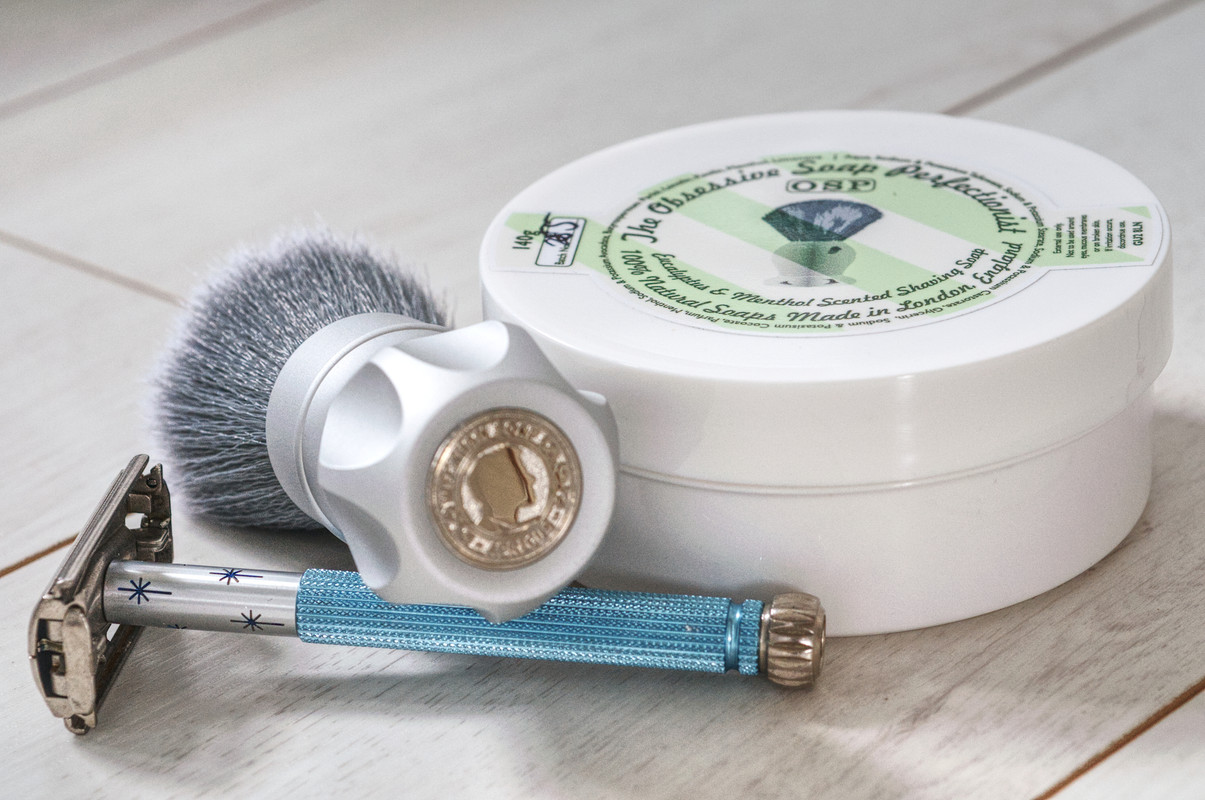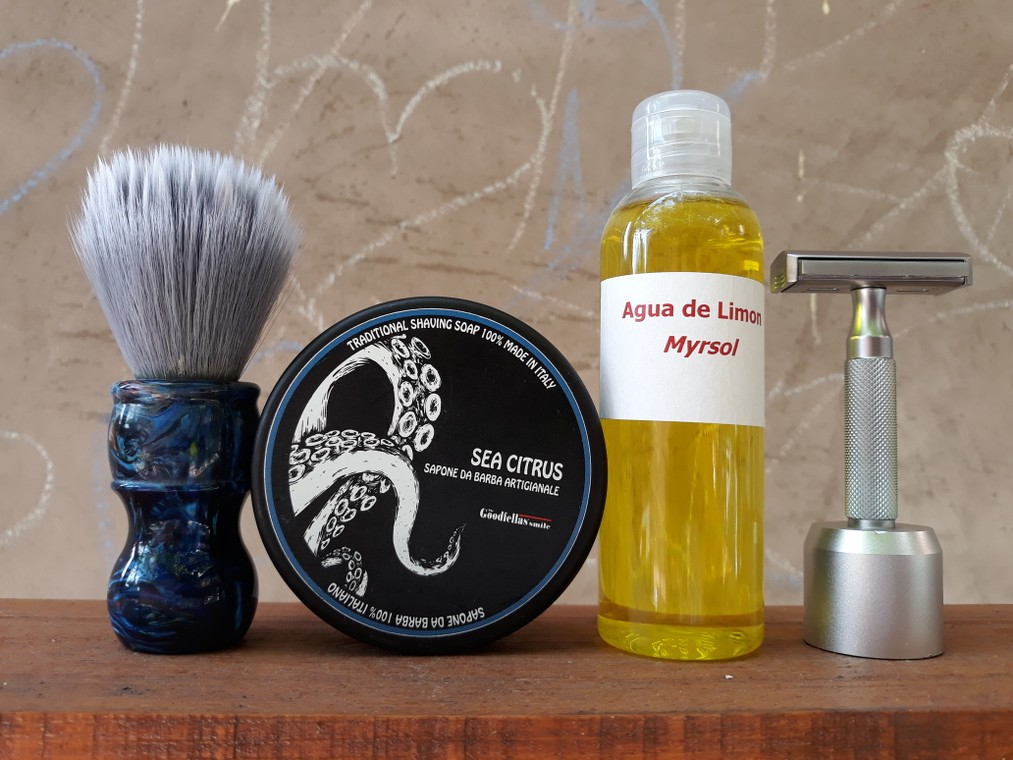Sotd - yesterday - Saturday the 29th of June -
Razor - Rockwell - plate 4
blade - Lodz Polsilver (2)
brush - Semogue 2000 boar
soap - Vitos 'Eucalyptus' tallow
post - witch hazel
a/s - Floid 'Mentally Vigorous'
balm - Proraso 'Green'
Result - just great.
A close smooth shave conducted to the sound of distant rolling thunder. Very zen. Enjoy yours - cheers - I.
William of Ockham - part the final - ‘The Name of the Rose.'
The initial foray into fiction of Italian semiotician, philosopher, medieval historian, anthropologist, professor and literary critic - Umberto Eco
(b.5/1/32 - d.19/2/16) - was published in 1980 - it sold multiple millions of copies - and was made into a - very good - film of the same name. On the face of it - a medieval murder mystery - but significantly more - in some ways - a very difficult book - it is extremely dense in places - in the edition I have - key plot reveals are in Latin without translation - less than helpful - even worse - is his fondness for meta-textual references - which he isn't going to spell out for the reader - you either take the time to work them out or you know them already. It is set in 1327 in a Benedictine monastery in northern Italy - a senior monk is summoned to answer charges of heresy against his order - Franciscan - after his arrival monks start getting murdered - and he is tasked by the abbot to find out what is going on - which he doesn't actually achieve - the murder ‘weapon' turns out to be a lost manuscript by Aristotle - I can't tell you which one - that would ruin the plot - if you fancied reading - or watching - it. What is the name of the lead character? - William of Baskerville. Eco confirmed he is a conflation of William of Ockham and - no shit - Sherlock Holmes. This - in my opinion - is genius - Ockham's stated position as ‘ it is futile to do with more what can be done with less,' is not so far away from Holmes' maxim - Watson - ‘ how often have I said to you - when you have eliminated the impossible, whatever remains, however improbable, must be the truth.' The book is precise in the time period it describes - the mindset and conflicts - those that affected Ockham - so is a useful prism to view the philosopher's life.
After the c. 8th Carolingian renaissance not much progress was made in Christian Europe until the opening of the second millennia - culture was starting to properly wake from slumber - economic and intellectual life picked up. We see the foundation of what we would recognise as universities - Bologna being the first - 1088. There seemed to be a need for new forms of religious expression - a flurry of new monastic orders were established - including the ‘mendicants' - from Latin ‘mendicans' - to beg - principally the Franciscans - 1209 and Dominicans - 1215. It is the former that concern us most. After an ecstatic vision listening to the gospel of Matthew founder St Francis (b.1181? - d.1226) decided to renounce all worldly goods - don sackcloth and wander about Italy ministering to the poor, sick and being nice to small animals. This proved to be popular and he was joined by many in his spiritual quest - the Papacy gave their blessing in 1209 - the ‘Order of Friars Minor' was born. Even during Francis' life the tension between those who upheld absolute poverty and others who would accept the usual trappings of monastic life became apparent - they ended up as effectively two parallel orders - the “Spirituals' and the ‘Conventionals.' By the time of William this had become a serious problem for the Catholic hierarchy - several popes had tried to do something about it but John XXII determined to put a lid on the situation - to the extent he banned the ‘Spirituals' and declared them heretical in 1317. Why the concern? This was not just some theological nitpicking about the value of ‘Apostolic poverty' - it created two very real problems for John - he was desperate to maintain order in the ranks - the church faced an existential crisis in the shape of the Holy Roman Emperor Louis IV - who invaded Rome in 1328 and installed the ‘anti-pope' Nicholas V in opposition to him. Secondly - the biggest issue - the ‘Spirituals' didn't own property so they couldn't be taxed - the high medieval Papacy was constantly on the verge of bankruptcy and was desperate for all the money it could possibly gather. The vast majority of Franciscans accepted Papal authority in 1329 - those that didn't - like William - were obliged to seek exile in the territory of Louis IV.
The c.12th had been a good one for the Spanish ‘reconquista' - they rolled back Muslim principalities from significant territories in the peninsula during the century - a by-product of this was - what had been a trickle - became a flood of ‘lost' ancient texts - virtually unknown in Western Europe for centuries. Not just philosophy but also mathematics, astronomy, geometry - Euclid's ‘Elements' - the Quran was translated into Latin in 1143. Most influential on William's fate was the complete surviving works of Aristotle becoming available by the mid c.13th - and equally importantly the commentaries written by the best Jewish and Muslim minds in Spain - principally Maimonides and Averroes. When he attended Oxford the dominant mode of learning and thought was ‘scholasticism' - it sought to reconcile ancient knowledge with Christianity - to ‘prove' the validity of church teaching by way of reason and logic - reaching its ultimate expression in the search for an argument that demonstrated that God existed. ‘Blind faith' was no longer good enough. This had been tried before - Anselm of Canterbury - produced his ‘ontological' proof' - an argument from the nature of being - in 1078 - but there are serious problems with it - being not far off a circular argument - it assumes that which it sets out to prove. The issue becomes significantly more complex when Aristotle is brought into the equation - his rigid empiricism - you can only rely on what is observable or measurable - doesn't sit well with Christian precepts. The first proper attempt required - probably the smartest man to have lived in the high medieval period - the Dominican philosopher St.Thomas Aquinas (b.1225 - d.1274). He argued in his ‘Five Ways' - from the ‘Summae Theologica' - with a mixture of ‘cosmological' and ‘teleological' proofs - the latter - an argument from design. It is an astonishing bit of work - head and shoulders above any contemporary. The problem is - if you were bright enough - as was William of Ockham - you can begin to pick holes in it - which he did. With his usual lack of tact and signature bad timing - this didn't go down well - Aquinas had just been made a saint - by guess who? - pope John XXII - the man William had spend the best part of a decade getting up the nose of. Exile ensued.









